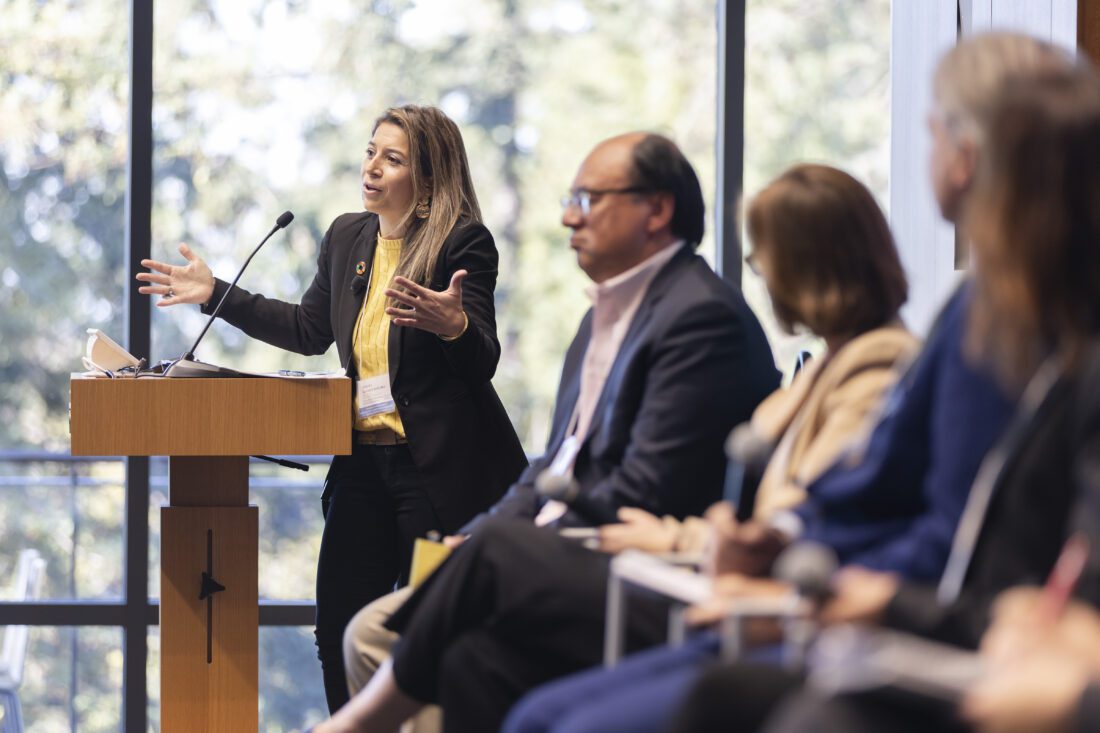Albert Lee, MBA 04 – Entrepreneurship Through Everyday Problem Solving
 Federal Reserve policymakers are among the best informed and most knowledgeable experts on the economy, and their decisions on interest rates are supposed to be based on exhaustive analysis of data. But Ulrike Malmendier, the Edward J. and Mollie Arnold Professor of Finance at Haas, believes something else may also be at work: the personal experiences of inflation that Fed decision makers have had over their lifetimes.
Federal Reserve policymakers are among the best informed and most knowledgeable experts on the economy, and their decisions on interest rates are supposed to be based on exhaustive analysis of data. But Ulrike Malmendier, the Edward J. and Mollie Arnold Professor of Finance at Haas, believes something else may also be at work: the personal experiences of inflation that Fed decision makers have had over their lifetimes.

Prof. Ulrike Malmendier
In a working paper coauthored with Stefan Nagel of the University of Chicago and Zhen Yan of the University of Michigan, “The Making of Hawks and Doves,” Malmendier offers evidence that Fed policymakers’ lifetime experiences with rising prices help shape their projections of future inflation, influence their votes on monetary policy, and color the tone of their speeches. If they lived as adults through periods of high inflation, such as the 1970s, they tend to be much more leery of runaway prices than if they came of age during later decades, when inflation was largely under control. In short, lifetime inflation experience is important in determining whether members of the Fed’s policy body, the Federal Open Market Committee (FOMC), are “hawks” or “doves”—that is, whether they emphasize keeping prices in check or also give high priority to fostering economic growth and employment.
“Our central hypothesis is that FOMC members’ voting decisions are influenced by the inflation experiences they have accumulated during their lifetimes,” Malmendier and her coauthors conclude. “When forming beliefs about future inflation, people overweight realizations of past inflation that they have experienced in their lives so far.”
Behavioral economics lens
The study has been hailed as a landmark analysis of the policymaking process using the principles of behavioral economics, a field of study with deep roots at UC Berkeley that takes insights from psychology and has introduced ideas such as irrationality, emotion, and force of habit into economic research. The paper “is the first to provide evidence of the impact of personal experience on the decisions and expectations of central bankers,” economist Daniela Bergmann wrote in Chicago Policy Review.
Malmendier, who holds joint appointments at Haas and in UC Berkeley’s Economics Department, is a rising star in behavioral economics and a past winner of the American Finance Association’s Fisher Black Prize, awarded every second year to a leading finance scholar under 40. Along with Economics Prof. Stefano DellaVigna, Malmendier co-founded the Initiative for Behavioral Economics and Finance at UC Berkeley. In previous work, Malmendier and Nagel have explored other ways personal experience affects economic behavior, such as how willing investors are to take risks. They concluded that appetite for risk in the stock and bond markets depends on how those markets have performed over an investor’s lifetime, challenging the conventional notion that investors act rationally to maximize gains.
Going against the tide
The paper on Fed policymakers also goes against the tide. Standard economic analysis holds that FOMC members’ inflation expectations and votes on policy reflect objective information on how the economy is performing. If that were the case though, each FOMC member would take the same policy position, since all of them have access to the same information. “We’re trying to understand why these experts have very different views,” Malmendier explains. “We think the inflation experience they have had in their lifetimes is an important reason why some people are optimistic and some pessimistic” about rising prices.
In the paper, Malmendier and her coauthors implemented a new model of experience-based learning, which holds that Fed policymakers forecast inflation based on how prices have behaved up to the time of an FOMC meeting. The researchers then applied statistical analysis to economic data to create an econometric model that incorporates lifetime inflation experience to forecast each FOMC member’s voting behavior. They controlled for changing attitudes by age, as well as political party affiliation and academic background in economics (i.e., whether the members held a PhD in the field). When the authors compared their experience-based forecasts with members’ actual voting behavior from March 1951 to January 2014, they found that those with more inflation experience were more likely to have hawkish voting patterns. The effect was striking: An FOMC member had an above-average experience with inflation (according to the experience-based forecast) was one-third more likely to take a hawkish stance that went against the committee majority, and also one-third less likely to take a dovish stance.
Speech analysis
They also looked at whether FOMC members’ attitudes about monetary policy could be detected in their speeches. When they performed a linguistic analysis of FOMC members’ public statements, they found that those with higher experience-based inflation forecasts used more hawkish language. In addition, they were more likely to issue higher inflation projections than internal Fed staff forecasts that had been derived from rigorous data analysis.
The authors’ most striking finding was that FOMC members’ personal experience with inflation is a key determinant of Fed policy. Specifically, the interest rate targets set at FOMC meetings—the Fed’s most important policy decisions—have often strayed from levels suggested by Fed staff and tilted toward the subjective forecasts of FOMC members. Malmendier and her coauthors estimate that, throughout most of the 2000s, the Fed’s interest rate targets would have been 0.50 to 1 percentage point lower if policy had been based exclusively on staff forecasts.
One of the implications of this research is that age matters when choosing Fed policymakers since experience of inflation differs largely according to date of birth. It’s a point The New York Times noted in 2014 when it pointed out that inflation had averaged 3.8 percent during the adult life of Charles Plosser, one of the FOMC’s most prominent hawks, but only 2.5 percent during the adult life of Narayana Kocherlakota, one of its most outspoken doves.
Malmendier’s work suggests that the times a person has lived through may someday be considered in the selection of central bank policymakers. “Our results add a twist to the practical notion that the choice of a policy maker can have a long-lasting impact on policy outcomes,” the paper concludes. “To predict a policy maker’s leanings, it is helpful to look at the person’s prior lifetime experiences.”
Posted in:
Topics:



